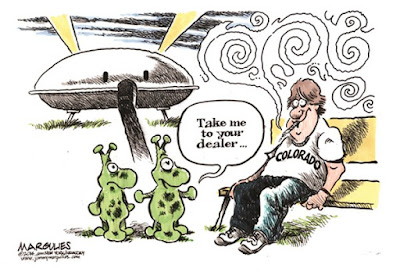San Fran Deliberately Chooses
The Path of Insanity
And the Sheeple Leftist voters keep re-electing the certifiably insane.
(San Francisco Chronicle) - “There’s one,” the police sergeant said as we drove through the Tenderloin. “There’s one of them there. That guy, see him?”
And another. And another. Sgt. Kevin Healy was showing me known drug dealers, and they were everywhere — swarming the neighborhood, chatting and smiling. They didn’t seem to have a care in the world.
That’s because they don’t. Not in San Francisco.
“It’s almost impossible to get convicted in this city,” said Healy, who works in the Police Department’s narcotics division. “The message needs to be sent that it’s not OK to be selling drugs. It’s not allowed anywhere else. Where else can you walk up to someone you don’t know and purchase crack and heroin? Is there such a place?”
San Franciscans love to think their city is like nowhere else, but this distinguishing factor isn’t anything to brag about.
When Gov. Jerry Brown recently nixed San Francisco’s plan to test the country’s first safe injection site where drug users can legally shoot up, he wrote in his veto letter that the plan was “all carrot and no stick.”
While I thought his veto was wrongheaded, he has a point. This city doesn’t seem to know the definition of the word “stick,” let alone consequence or accountability. Unless, of course, you’ve parked your car at a meter for five minutes too long. Then you can expect an immediate stick in the form of a high-priced ticket.
As a safe injection site now appears at least a year off, city officials must come up with other ways to combat San Francisco’s dire drug crisis. Obviously, far more drug treatment services are needed. But one area officials barely mention is an obvious one: cracking down on the people supplying the devastating drugs. Police say drug dealers from the East Bay ride BART into San Francisco every day to prey on the addicts slumped on our sidewalks, and yet the city that claims to so desperately want to help those addicts often looks the other way.
You can walk through the Tenderloin, Civic Center, South of Market and the Mission and easily spot men handing over little plastic baggies with drugs in exchange for cash like it’s no big thing. In broad daylight. In front of pedestrians. Even in front of police.
Supervisor Rafael Mandelman said he’s recently gotten complaints from homeless people that they’re afraid to use the restrooms in Dolores Park because they’ve been taken over by drug dealers.
Lava Mae, the nonprofit that turns trailers and old Muni buses into showers and restrooms for homeless people, is stationed outside the Main Library every Tuesday. Staffers say they used to see one or two drug dealers milling around, but in just the past month, that’s risen to 10 to 15.
The dealers are so brazen, they plant themselves in Lava Mae’s chairs and deal beneath the nonprofit’s awning. The nonprofit has already canceled its Friday morning sessions outside the library because of the prolific dealers and is debating whether to continue on Tuesdays.
Read More . . . .























.jpg)
























